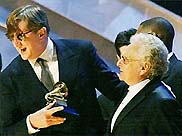February 28, 2002
Big Winners at the Grammys: Alicia Keys, U2 and 'O Brother'
By NEIL STRAUSS
 |
| ((Reuters)) |
| Country legend Ralph Stanley, right, and producer T Bone Burnett accepted album of the year honors for the soundtrack of "O Brother, Where Art Thou" at the 44th Grammy Awards. |
 |
| ((AP)) |
| Bono and his band U2 were among the early winners tonight at 44th Grammy Awards in Los Angeles. |
LOS ANGELES, Feb. 27 — Proving the contention that it is nearly impossible to ever predict the tastes of Grammy Awards voters, the CD that music fans assumed was least likely to succeed earned the night's top honor, album of the year. Beating out recordings from Grammy favorites U2 and Bob Dylan, the big winner at the 44th Annual Grammy Awards, held tonight at the Staples Center here, was a southern roots music album: the soundtrack to "O Brother, Where Art Thou?"
"It was a sweet defeat," said the Edge, guitarist for U2, on losing to a soundtrack he was a fan of.
It was the climax to a long night in which bluegrass music wreaked its vengeance on the music business and country radio for giving old-time songs and pioneering musicians short shrift. Songs and albums associated with the film (a Homeric Southern odyssey directed by the Coen brothers) won five Grammys. One of its awards, for best country vocal collaboration, even went to a band that doesn't really exist: the Soggy Bottom Boys, characters in the movie whose vocals were provided by a Nashville pick-up band (featuring Dan Tyminski, Pat Enright, and Harley Allen).
And one of the night's most poignant moments was the mountain-music pioneer Ralph Stanley singing a cappella, in a black suit against a stark black backdrop, one of bluegrass's most moving ballads of mortality, "O Death."
T-Bone Burnett, who produced the soundtrack, said in his acceptance speeches that not even "minds as elliptical as the Coen brothers' could write this ending."
Elsewhere, other songs and acts associated with bluegrass won four Grammys, dominating the country field. And that doesn't even include the classical crossover award that the banjo player Bela Fleck won for his classical-music interpretations on "Perpetual Motion." Southern music's surprise domination of this year's show was sealed with the standing ovation the country star Alan Jackson received for his poignant response to Sept. 11, "Where Were You (When the World Stopped Turning)."
The night's other big winner was the neo-soul singer and pianist Alicia Keys, who practically ran out of people to thank as she collected five of the six awards she was nominated for. In each of these categories, she was in competition against another R & B newcomer, India.Arie, who was shut out. Among Ms. Keys's awards were best new artist, song of the year (a songwriter's award), best R&B song, and best R&B album.
U2, who opened the show with a fervent, Grammy-glitz-free rendition of "Walk On" (especially in comparison with the over-the-top all-star version of "Lady Marmalade" that followed), picked up four awards: record of the year (given to a single song), best rock album, best pop vocal performance by a duo or group, and best duo or group rock performance for three separate singles from its comeback album, "All That You Can't Leave Behind." (The first single from the album, "Beautiful Day," won three Grammys in last year's ceremony.)
The album's return-to-rock paeans to universal peace, the transcendent human spirit, the gift that is life, and the city of New York, which already resounded deep with listeners and fans, took on even greater significance after Sept. 11. "The songs did change their meaning," Bono said backstage. "You're the songwriter, you're supposed to know what those songs are about. You're often wrong. Music changes shape to fit the predicament it finds itself in. And this year, the predicament was a very different America."
In the rap field, Outkast and Missy Elliott won two awards each. But again and again, the winner's circle was dominated by bluegrass and roots music. What does this mean?
In the press room backstage, musicians shared their answers. "I think it means good music," said Earl Scruggs, the 78-year-old banjo player whose latest version of "Foggy Mountain Breakdown" won for best country instrumental. (His only other Grammy was in 1968 for this same song.) Jerry Douglas of Alison Krauss and Union Station (which won two Grammys, apart from the "O Brother" soundtrack) said that he believed the events of Sept. 11 caused Americans to search for the roots of their culture and yearn for earlier times.
Emmylou Harris, who sings on the "O Brother" soundtrack, said backstage that she was surprised that the album was even nominated. "To win it," she said of the album of the year award, "something's going on but I don't know what it is."
Ralph Stanley won his first Grammy ever by beating younger stars like Tim McGraw and fellow legends like Johnny Cash in best male country vocal performance (for "O Death."). Still glowing from the award, Mr. Stanley said that, as a result of the awards, this type of music "is going to take over for a while and do great, and replace some of the music that they've had for the past couple of years.
In general, the awards reflected the current turmoil in the music business, where sales are down roughly 5 percent, Internet piracy and CD burning seem to be spiraling out of control, artists are banding together to confront their labels on certain issues, and the economic downturn and increasing consolidation are leading to major cuts for major labels.
The Grammy choices also showed a distance from the mainstream music business, favoring more traditional and independent-minded musicians. Elsewhere in country, the best album award went to a Hank Williams tribute album ("Timeless") and the award for best female country vocal performance went to Dolly Parton (who has lately been recording bluegrass for an independent label).
In the pop field, other underdogs won: Sade beat 'N Sync for best pop vocal album category and Lucinda Williams took home the best female rock vocal prize.
Even Ms. Keys, on receiving her best R&B album statuette, dedicated it to "thinking out of the box."
But perhaps the biggest message to the industry came from the classical field: Sir Colin Davis won a coup for the London Symphony Orchestra when his recording of the Berlioz opera "Les Troyens" won awards for best classical album and best opera recording. The honor is especially significant since the album was released on the orchestra's private independent label, LSO Live, which was formed in part in reaction to the neglect by major labels of classical music.
"I think this is a message to absolutely everybody in the record business," said the album's producer, James Mallinson. He then added a message to the classical music business: "This is living proof that you can be successful with classical music on record, and you can sells lots and lots of it."
For best small ensemble performance, Gidon Kremer and Kremerata Baltica's innovative concept album "After Mozart" (complete with the sounds of modern electronic gadgets in Leopold Mozart's "Toy Symphony") took home the prize. And in jazz, the tenor saxophonist Sonny Rollins won his first-ever Grammy for best jazz instrumental album.
And in other fields, The winner of best musical show album was no surprise: "The Producers." The video "Recording the Producers: A Musical Romp with Mel Brooks" won Best Long Form Video.
A surprise was the winner of the best song written for film or television award, in which Grammy favorite Sting (for a song written with David Hartley from "The Emperor's New Groove") lost to They Might Be Giants, who perform the theme for the TV show "Malcolm in the Middle."
Copyright 2002 The New York Times Company
![]()